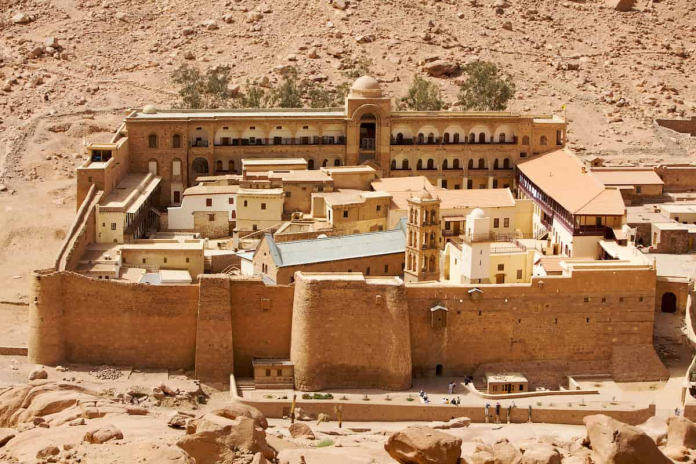The Egyptian government is pursuing guarantees to construct a major tourist resort surrounding one of Christianity’s oldest active sites, according to a draft agreement obtained by Euractiv.
This development centres on the 6th-century Greek Orthodox Monastery of Saint Catherine, a UNESCO-designated site of “outstanding universal value” situated at Mount Sinai’s base in Egypt’s southern desert.
The negotiations follow a contentious May ruling by an Egyptian court that stripped the monastery of its land rights, transferring ownership to the state. Subsequent meetings between Greek and Egyptian foreign ministers yielded an agreement to seek a permanent solution, with an announcement anticipated imminently.
Athens maintains the monastery’s legal status as non-negotiable. The draft framework agreement reflects this stance, explicitly preserving the site’s religious character, ensuring monks can continue rituals, and confirming the monastery retains ownership of its buildings.
However, the same document guarantees Egypt the “ability to implement its future plans aimed at sustainable development as one of the objectives of the modern Egyptian state.” Cairo has previously confirmed these plans involve transforming the area into a tourist resort, a prospect causing deep anxiety within the monastic community.
The monastery’s unique autonomous status, historically recognised by successive rulers from Islamic caliphates to the Ottoman Empire, has enabled its uninterrupted operation for over 17 centuries. However, activists from World Heritage Watch report Egypt has already commenced development projects nearby, alleging ongoing construction breaches UNESCO’s World Heritage Convention.
A significant sticking point in negotiations involves the monastery’s invaluable treasures, ranging from gilded icons to ancient manuscripts. The draft agreement proposes Egyptian authorities gain oversight of their preservation “under the provisions of the Antiquities Protection Law,” raising concerns among minority faith groups, including Coptic Christians, about state control over sacred objects.
Greece values Egypt as a strategic eastern Mediterranean ally, particularly regarding migration coordination and energy projects. When questioned on protecting the monastery, an EU spokesperson said that the Commission would track developments and “the commitments made by the government of Egypt, in close coordination with our member states.”
